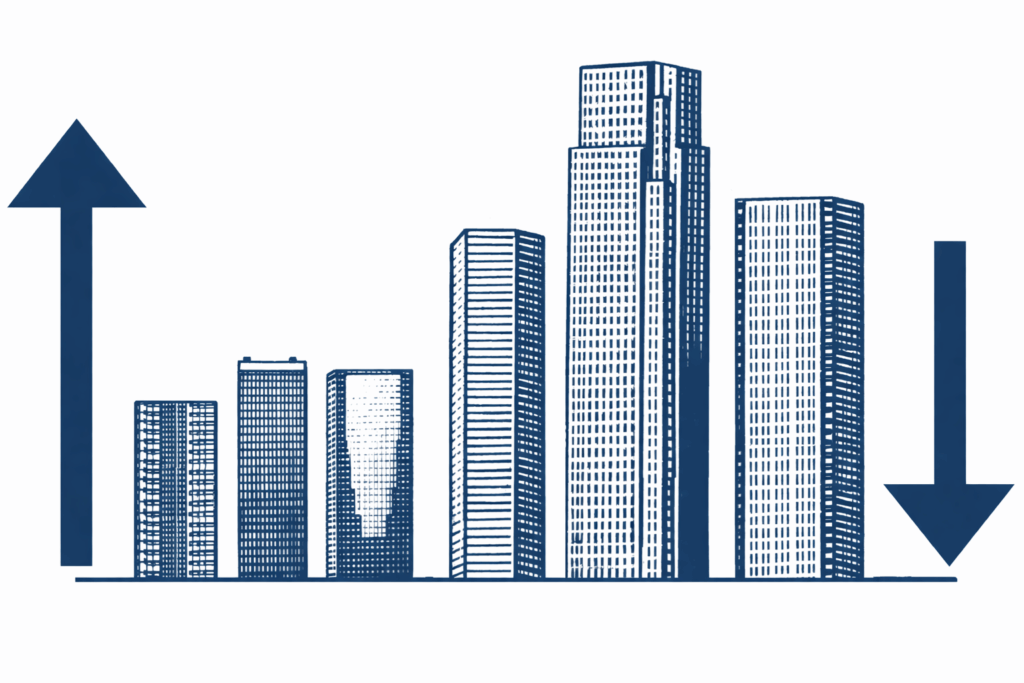Details Are Part of Our Difference
David Booth on How to Choose an Advisor
20 Years. 20 Lessons. Still Taking the Long View.
Making the Short List: Citywire Highlights Our Research-Driven Approach
The Tax Law Changed. Our Approach Hasn’t.
Category: Education
2025 Market Highlights
 If 2025 reinforced anything, it is how quickly markets can test conviction and how costly it can be to react emotionally or narrowly.
If 2025 reinforced anything, it is how quickly markets can test conviction and how costly it can be to react emotionally or narrowly.
By April 8, the S&P 500 was down 15%, driven largely by Liberation Day and the sudden imposition of global tariffs. Volatility spiked, sentiment deteriorated, and the narrative quickly shifted toward protectionism and questions around US leadership.
Then, just one day later, markets delivered a stark reminder of how unpredictable short-term moves can be.
On April 9, the S&P 500 experienced one of the largest single-day rallies in history, with the S&P 500 rising 9.5% in a single session. Note: That one-day gain is larger than the average annual return of the S&P 500 since it’s existed. Investors who had de-risked or moved to the sidelines in response to the drawdown were not there to participate.
Despite being down double digits just three months into the year, the S&P 500 finished 2025 up nearly 18%, an outcome that few would have predicted during the spring selloff.
But the more important story was not just that markets recovered. It was where the returns came from. Global markets, as measured by the MSCI ACWI index were up 23%.
The Case for Global Diversification
2025 was a powerful reminder that returns rotate, often abruptly, and often away from what has worked most recently.
- US Market (S&P 500): +18%
- International Developed ex US (MSCI World ex US Index): +33%
- International small value (MSCI World ex US Small Value Index): +40%
- Emerging Markets (MSCI Emerging Markets Index): +34%
Investors who reduced international exposure or concentrated further into US equities, often justified by recent outperformance, materially underperformed what markets ultimately delivered.
International small value in particular was one of the strongest performers globally, with the ETF we use, the Avantis International Small Value ETF, returning 50% for 2025!
The Bigger Lesson
Markets do not reward confidence in narratives. They reward discipline. Investing in all types of markets and staying invested in all Markets.
Short term drawdowns are uncomfortable. Large single day rallies are unpredictable. The investors who captured 2025 returns were not those who timed exits or chased recent winners. They were those who stayed invested, stayed diversified, and allowed markets to do what they have historically done over time.
In years like 2025, the value of diversification is not theoretical. It is measurable.
And it is earned by maintaining exposure when doing so feels hardest.
Hey Hill! Is Social Security Really Running Out?
Recently, we hosted a review meeting with a longtime client. He leaned back in his chair and asked a question I could tell had been on the tip of his tongue all meeting, “Is Social Security going to be there for us when we can take it?” His voice was half-joking, but his eyes told me this was a question he’d been pondering for a while.
A few weeks later, in a meeting with a much younger client, a similar question came up as we reviewed her Longview Analysis. “We should probably assume we won’t get any Social Security,” she stated. “I keep hearing it will be gone by the time my generation retires.”
Social Security is one of the default income streams we have built into our planning, but there are plenty of headlines warning that it is “running out of money”. So are we crazy to plan assuming that it will be around?
The short answer is no. And part of taking the Long View is remembering that headlines are designed to grab your attention, not necessarily to give you the full story. When we step back and look at the complete picture, Social Security is often far more durable than the news cycle suggests.
Much of the anxiety around Social Security comes from the annual reports released by the Federal Old-Age and Survivors Insurance (OASI) and Federal Disability Insurance (DI) programs projecting their Trust Funds to be depleted by 2035. These Trust Funds are simply reserves built up during years when Social Security collected more in payroll taxes than it paid out.
As Baby Boomers retire and live longer, benefit payments now exceed annual contributions, which means the reserves are being drawn down. But what the headlines often leave out is that the Trust Funds are not the system itself. Even if the reserves are depleted, workers will still be paying payroll taxes every paycheck, and those ongoing taxes are currently projected by the Social Security trustees to continue funding roughly 80% of benefits.
The problem Social Security faces is primarily a math problem, not an existential one. And the math problem has multiple straightforward fixes that have been discussed for years, including:
- Increasing the Social Security payroll tax rate modestly
- Subject all wages to Social Security payroll tax (remove the current cap)
- Reduce current and future benefits
- Reduce only the future beneficiary’s benefits
- Raise Full Retirement Age
- Slow benefit growth for top earners
- Change the way cost-of-living adjustments are made
- Some combination of two or more of these measures
Many policy experts expect that lawmakers will need to make adjustments over time, although it is uncertain which combination of tools they will choose. Social Security is a significant program that is relied upon by many Americans. More than 70 million Americans receive benefits today, and nearly every worker contributes with the expectation that those benefits will be there when they retire.
It remains one of the most consistently popular programs in the country and has been the backbone of American retirement for generations. That level of reliance and public support is one reason many policymakers focus on keeping it solvent.
At Hill, we plan based on data and evidence, not speculation. For clients nearing retirement, we typically model full benefits under current law. For younger clients, we still model full benefits, but we review scenarios that assume reductions so your long-term plan stays durable regardless of what policymakers decide. These scenarios are planning tools and do not represent predictions about future legislation. What we do not do is assume Social Security will disappear. The evidence available today does not point in that direction, and the popularity of the program makes that outcome appear extremely unlikely, although future changes to the program are always possible.
Of course, if you’d like us to assume a “doomsday” scenario where no Social Security” system exists, we’d be happy to model it for you. But for many clients who’ve been consistent savers over the years, they will learn that they will still be fine without the additional income from Social Security.
While it is true that Social Security is under strain, it is not collapsing. The headlines sound alarming because uncertainty sells, but the reality is far more stable and manageable.
If you have been feeling uneasy about what this all means for your plan, let’s talk. We want you to understand the system, understand your plan, and feel confident about the path ahead.
Fees: Opaque vs. Transparent
Clients and those that know us well expect clarity and transparency in all that we do, especially when it comes to fees. In fact, HIG goes overboard to fully communicate all fees and expenses because every last basis point matters.
In contrast, most of Wall Street uses every means possible…including regulations…to disclose as little as possible, especially when it comes to fees.
Jason Zweig of the Wall Street Journal makes a crystal clear statement in a recent article:
“The first question on most investors’ minds is usually: How much can I make on this? Instead, their first question should always be: How much will this cost me?”
We wholeheartedly concur.
Be on the lookout for and learn about the latest pending legislation that would hide fees from investors here.
If you’re interested in more clarity and transparency in your life, set up a time to talk here.
Disclosure:
Hill Investment Group Partners, LLC (HIG) is an SEC-registered investment adviser. Registration does not imply a certain level of skill or training. The information in this publication is for educational and informational purposes only and does not constitute an offer to sell, or a solicitation of an offer to buy, any specific securities, investments, or investment strategies. Nothing contained herein should be construed as individualized investment, tax, or financial advice. Always consult with a qualified financial adviser and/or tax professional before implementing any strategy discussed.



